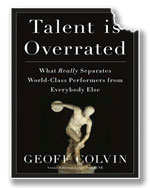20 Years of Sales Lessons
October 10th, 2017It’s hard to believe, but this month marks the 20th anniversary of Z3 Performance Development, Inc. I founded ZThree in 1997 with a simple vision of “Freedom Through Results, Results Through Responsibility”. I did so to help responsible owners and leaders free themselves from their perceived shackles and obstacles—the challenges they had the most difficulty overcoming. For many owners, there was no greater obstacle in business than creating a consistent, predictable, scalable sales organization.
Much has changed since then, in selling, and in our culture. Back in 1997, Titanic and Men in Black were dominating at the box office and viewers were tuning into Seinfeld on TV. South Park premiered. Tiger Woods was 21 and earned the #1 ranking on the PGA Tour in his first season. The Dow Jones Industrial Average closed above 7000 for the first time. The Harry Potter phenomenon was in its infancy, and so was the dot-com era.
Steve Jobs returned to run Apple Computers and the iPhone did not exist. Neither did Google. Or Facebook. Home video games gained popularity with the Nintendo 64, but kids still spent more time playing outside than being glued to their devices. Amazon went public at $18 per share (Damn, I wish I got in on that one…)
Less than 100,000 websites existed at the time. No one had heard of a “blog” yet. “High-speed internet” using cable modems would soon be replacing dial-ups, and DVDs would soon replace VCRs. The term “Social Media” would not become universally accepted for many years.
The internet and knowledge transfer changed the world of sales. Forever.
At ZThree, we’ve worked with hundreds of business owners and many thousands of sales professionals and have witnessed a long-overdue transformation in selling. In 1997, most people did not trust salespeople (and with good reason). Over time, cultural changes have forced a good portion of the rest of the profession to (reluctantly) migrate away from many of the old-school, manipulative sales tactics that have existed since the Model T. These techniques didn’t work well 20 years ago. Today, they are laughable.
Rapid knowledge transfer has allowed buyers to gain leverage over pushy, talkative salespeople, forcing them to change their ways. Rehearsed scripts, leading questions, boring demos, and trial closes have gone the way of the Telex Machine.
From the onset, our UnCommon Sense© methodology has encouraged people to behave like “anti-salespeople” and “facilitators”. ZThree’s processes and philosophy were never based upon traditional sales manipulation, but instead upon buyer psychology, principles of effective communication, and mutual understanding. We always believed convince-aholic™ manipulation would ultimately perish. It has taken a while, but better late than never!
Attention spans have contracted dramatically, shortening more than 5-fold during the last twenty years (Twitter built a business on 140 characters). Instant gratification has also become a staple of modern society. In order to remain competitive, these factors cannot be under-estimated.
If a salesperson fails to earn a trust connection with a prospect and open up a buyer’s listening within a couple of minutes, they are essentially finished before the game begins.
Before the Internet and reputation management changed the world forever, product knowledge was perceived to be paramount among sellers. Today, product knowledge falls near the bottom of the list with regard to importance in generating sales. Great salespeople will know about their product or service, but they also understand that product knowledge pales in comparison to understanding belief systems, communication dynamics, trust development, listening skills, and buyer psychology. Interestingly, these issues have always been paramount in the minds of the buyers. Unfortunately, it has taken most sellers many decades to learn and adapt (and many still haven’t).
I can go on for days about requirements for success in today’s selling environments, but since your attention span is also shorter than in 1997, here is a quick list of things you can implement immediately:
1. Stop talking and start listening: Reduce your talking by 75% and watch what happens. I promise you will not be disappointed.
2. Don’t offer demos or proposals until you understand your prospect’s buying motives. Before you launch into telling, get crystal clear about the decision process, the decision maker, their needs and pains, and how much they are committed to invest. This is easier than you might think. Since you’ll be talking less, you’ll be learning much more!
3. Do not try to convince. Instead, spend your time understanding the real picture.
4. Make the conversation about them, not you. Always.
5. Change your goal. Don’t focus on getting the order. Focus on investing your time (and their time) wisely in pursuit of adult conversations and learning the truth.
6. Use LinkedIn and other social media to learn about interests and preferences (especially personal interests), but do not assume anything you read online is true without verifying. Assumptions are killers.
7. Learn about your prospect’s communication preferences. Do they prefer to be contacted via phone, text, email, other? But beware, never hide behind technology. You cannot listen effectively to the written word, and it is much easier for a buyer to leave out important details if you are not there to probe deeper.
A hell of a lot has changed since 1997, but it is also surprising how much has not changed. People are still people. They still value trusted relationships and still have feelings. Recent buying surveys show that the majority of executive buyers still make purchase decisions based upon their interaction with the company salesperson. Buyers can certainly conduct more research than ever before speaking with you, but people still buy for emotional reasons (and always will).
Selling today not only requires a different approach and tactics, it requires an entirely new mindset and way of thinking. If you have the correct belief system, your words and actions will follow naturally.
Before I sign off, I want to offer a gigantic thank you to all of you for helping ZThree’s vision become a reality and for helping me (and us) learn and grow. You have enriched my life more than you know.
Our team remains committed to making an impact in your work and life, and to helping you achieve the freedom you deserve.
With gratitude,
Joe
Copyright © Joe Zente 2017. All Rights Reserved.














